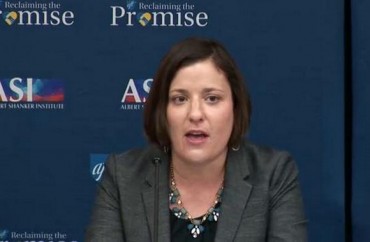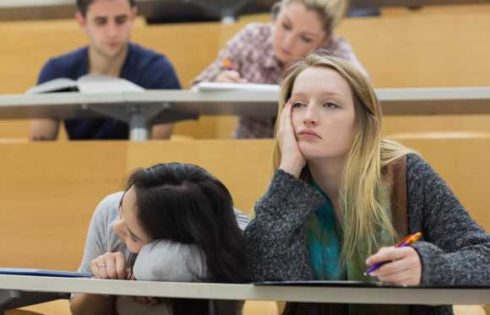
Employees also allege professor created toxic work environment
A prominent Temple University professor who famously trolled Republicans on Twitter a few years ago was recently placed on paid administrative leave from the school’s Hope Center for College, Community and Justice amid an investigation into potential financial mismanagement.
Sara Goldrick-Rab, hired by Temple in 2016, has led the Hope Center since 2018, but was put on leave after the university hired an independent investigator to look into the center’s finances.
Goldrick-Rab remains a professor of higher education policy and sociology at Temple.
“Temple takes seriously its responsibility to ensure a supportive workplace climate and professional environment,” Senior Director of Communications Deirdre Hopkins told The College Fix in an emailed statement.
“Since the time that concerns were raised both by Dr. Goldrick-Rab and individuals working at The Hope Center for College, Community, and Justice, the university has undertaken a review of operations in accordance with university policy,” she said.
“We anticipate completing that review shortly and will move forward in the best interests of Temple and The Hope Center.”
Inside Higher Ed interviewed more than a dozen past and present center employees who alleged the center also suffered from a “toxic” work environment under Goldrick-Rab’s leadership.
Goldrick-Rab did not respond to a request for comment by The College Fix. Neither did current Hope interim Director Anne Lundquist.
The Hope Center describes itself as “an action research center transforming higher education into a more effective, equitable, and impactful sector.”
Last year, the center brought in $6 million and employed 50 people. Just last week, the center announced it would be laying off eight workers. According to interviews with current and past employees, nearly two dozen Hope Center workers have left in the past several years.
Former employees told Inside Higher Ed that Goldrick-Rab had told Hope Center workers to raise money for the professor’s nonprofit organization, Believe in Students, rather than for the center, claiming that funneling money through her own tax-exempt organization allowed Goldrick-Rab to circumvent many of the school’s rules.
“She hated working within Temple’s internal systems and actively sought out ways to bypass them,” one former employee told IHE. “She would direct staff at the Hope Center to write grants on behalf of Believe in Students, even though we were not employed by them or obligated to do so. Because the center is 100 percent grant funded, we should not be using any of our time to write grants for another organization.”
Goldrick-Rab “even tried to justify these activities by claiming Temple’s chief compliance officer signed off on the relationship and saw nothing wrong with the arrangement,” the former employee said. “She didn’t care that what she was doing was wrong as long as she wasn’t getting caught. She tried to deceive a lot of people.”
Former Hope Center Andy Howe defended Goldrick-Rab in an essay, saying the complaints from employees are “opinions of a small group of past and present employees who are creating noise that slows down progress of every institutional partner of the Hope Center, and in turn, trickles down to our students needing support for basic needs.”
“I personally hope people who read the piece can see how this is not news worth taken seriously,” Howe said of IHE‘s reporting.
Goldrick-Rab initially made news as a professor at the University of Wisconsin-Madison in 2015 when she tweeted that she saw “terrifying” psychological similarities between then-Wisconsin Gov. Scott Walker and Nazi leader and mass murderer Adolf Hitler.
“My grandfather, a psychologist, just walked me through similarities between Walker and Hitler,” she wrote. “There are so many-it’s terrifying.” The next day, she tweeted “No doubt about it-Walker and many Wisconsin Legislators are fascists. Period. They proved it today. #SHAME.”
In a later interview with The College Fix, Goldrick-Rab apologized: “I clearly caused offense, and I’m sorry for that. That was not my intention.”
Goldrick-Rab again caused controversy when her school found out she had been trying to dissuade happy incoming freshman from attending UW-Madison because of proposed changes to faculty governance and tenure. Goldrick-Rab admitted to searching Twitter for pictures of incoming freshman and essentially telling them to take their money elsewhere.
“No one cares sara,” one of the students had replied. Another answered “who are you lol.”
UW-Madison’s faculty governing group later criticized Goldrick-Rab, saying she hurt both academic freedom and the university “with inaccurate statements and misrepresentations.”
When Temple hired Goldrick-Rab, they were aware of her frequent Twitter use and controversies she had created.
“Looking objectively at her record,” Temple Dean of Education Greg Anderson said at the time, “it’s really a no-brainer for any serious college or university to want to have faculty like her, based on her funding productivity, her scholarly and research activity, and her impact on public policy and the postsecondary arena.”
But those good feelings didn’t last long for many of the employees that worked under Goldrick-Rab.
“The center fails to live out the public values of the work being done when it comes to the treatment of staff,” one anonymous former employee told Inside Higher Ed.
“There’s drama everywhere, you know,” said another employee. “You go to places of work and there’s bad bosses. There’s people who do shitty things. I get it. But this is just untenable.”
Goldrick-Rab initially told IHE that she was the one who had initiated the investigation, calling for more resources for the center. But her placement on leave suggests she may not have been entirely forthright. She would not tell the website whether her leave was voluntary.
During her tenure as higher education policy and sociology professor at Temple, Goldrick-Rab has focused on issues such as “food insecurity,” arguing students are starving on campuses across America. She argued in a 2018 New York Times op-ed that students have a difficult time learning while hungry, and thus “food insecurity is strongly linked to lower graduation rates.”
Goldrick-Rab further claimed “former foster youth, L.G.B.T. students and students of color are at substantially increased risk” for food insecurity.
However, critics of “food insecurity” research take issue with how the term is defined. For instance, a Temple study asked students questions such as whether they feared “food would run out before I got money to buy more,” or “Did you ever eat less than you felt you should because there wasn’t enough money for food?”
Further, the survey conducted by Temple only had a 5.8 percent response rate and students were coerced to respond by offering them the chance to win $100 – which would naturally skew responses toward less affluent students.
“The people who answered it are almost certainly not representative of the general population,” wrote Robert VerBruggen of National Review at the time. “The NYT simply ignores this fact.”
Despite being on leave for several months, she has been active on Twitter, posting a message on July 3 that says “See you on 7/19. #Family #Vacation,” along with a photo of herself wearing a t-shirt that says “you took my joy I want it back.”
See you on 7/19. #Family #Vacation pic.twitter.com/9004xUAFJn
— Sara Goldrick-Rab (@saragoldrickrab) July 4, 2022
MORE: Univ. of Wisconsin professor says Hitler, Scott Walker share ‘terrifying’ similarities
IMAGE: Albert Shanker Institute/YouTube
Like The College Fix on Facebook / Follow us on Twitter





Please join the conversation about our stories on Facebook, Twitter, Instagram, Reddit, MeWe, Rumble, Gab, Minds and Gettr.